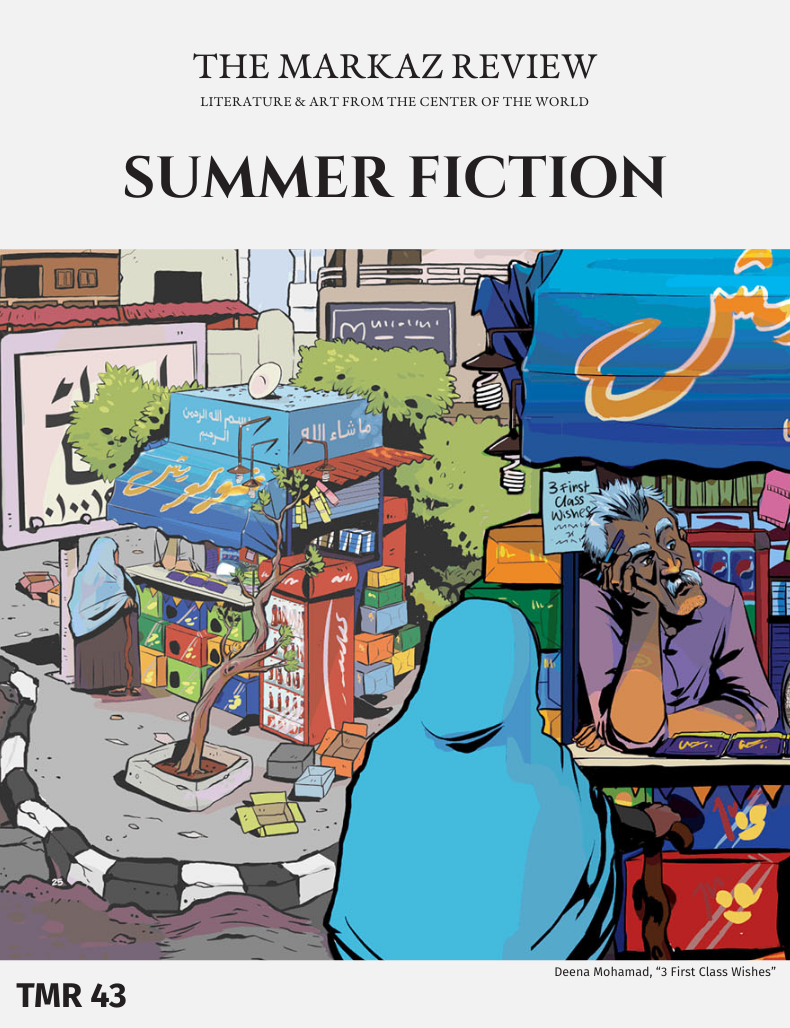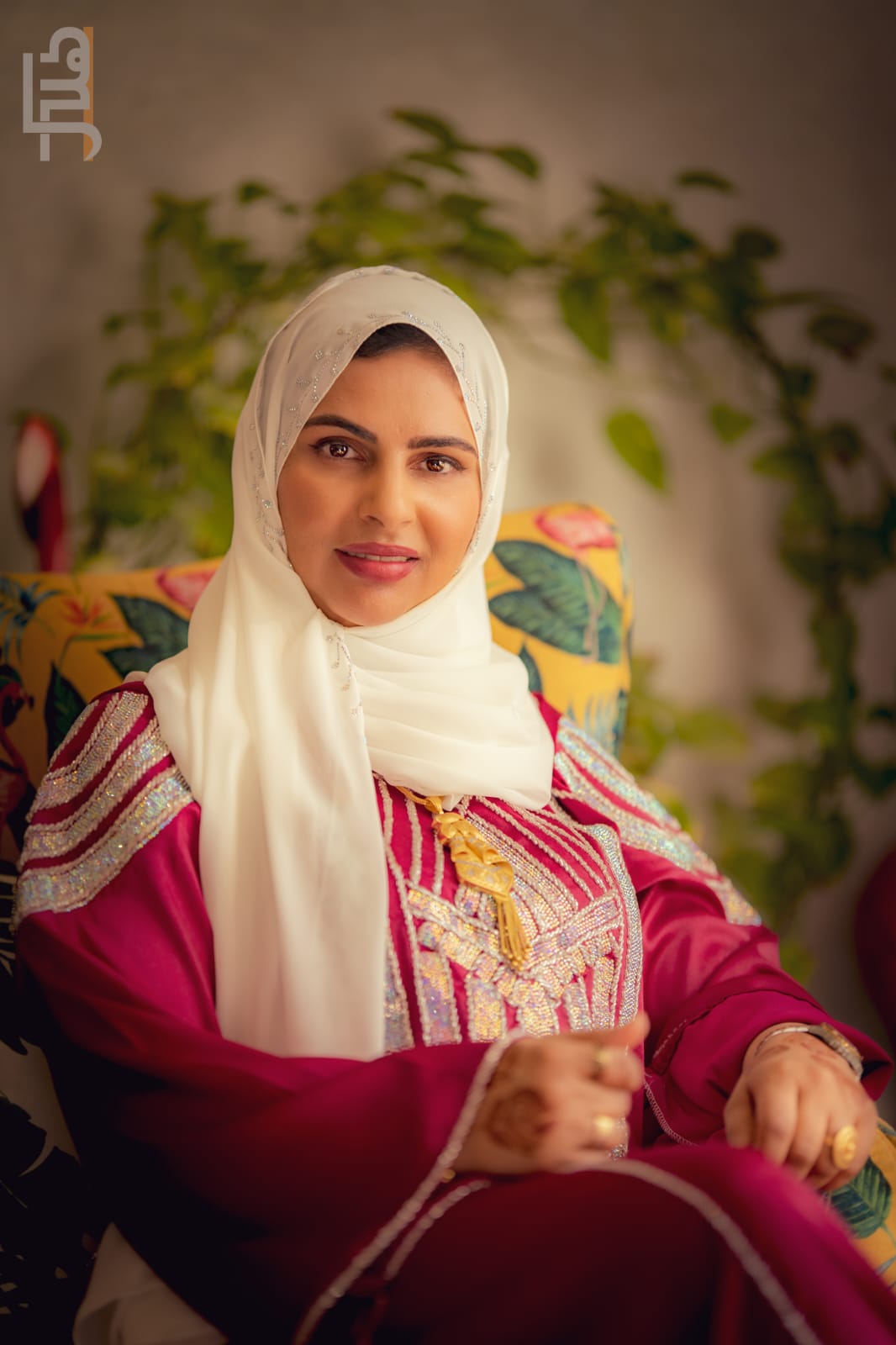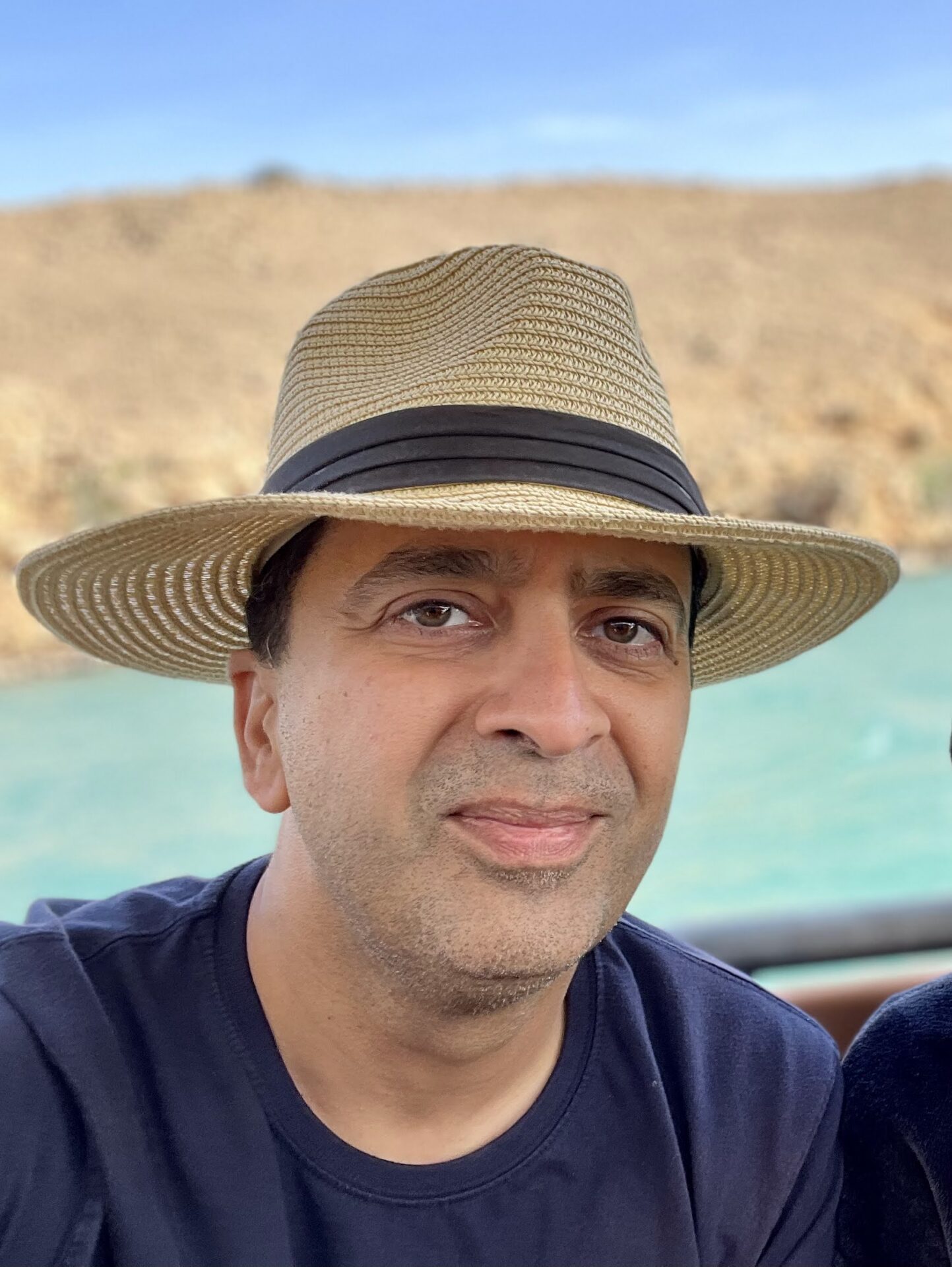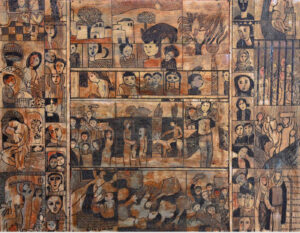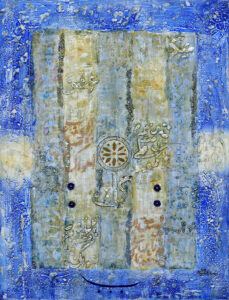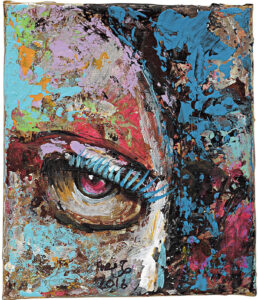A bittersweet coming of age story about race and self from the novel Things Are Not in Their Place, by one of Oman’s foremost woman novelists.
I stand in front of the mirror, running the back of my fingers over my soft cheek. My skin is brown, just like that of most people in this country. My eyes are beautiful. My curly hair rests quietly under a hairclip. My nose is straight as a sword. My lower lip is thick and doesn’t quite go with the upper one.
I may be a besara*, but there’s no denying my beauty. I can walk around the market, visit respectable people’s homes, and go wherever I want without anyone recognizing my inner darkness. I’m not like the “slaves,” but I’m also nothing like the pure Mona with her delicate features, free from the nooses that snare me from time to time because my status is somewhere in the middle. I cried in my mother’s arms for hours the day my friend Hanan mocked me that I wasn’t a free person. We were in the first grade at the time. There was no difference between my skin color and hers, or her nose and mine, only my hair, asleep under the white school hijab, and my full lower lip.
I could have sworn that Hanan was actually a little darker than me. But when the girls took off their hijabs during free periods and Hanan flung back her hair, soft bangs flowed over her forehead like a waterfall of light.
My mother told me: “You’re not a slave, Amal, but you’re not exactly free either.”
Oh my God! How cruel is this vicious circle, this ember of doubt, this crime that I’m held accountable for without having committed it! I discovered, in life’s first steps, that I was defective.
Thinking that academic excellence could conceal my flaw, I tried hard to excel at school, but remained frustratingly below average. In desperation, I turned to my aunt, Ziyoon, who’d married a Zanzibari man without her family’s consent. She’d acquired a substantial library after coming to terms with the reality that she’d lost the love of her sisters, including my mother. My aunt had forsaken a lot by marrying a man of another race, but he gave her something precious in return: the opportunity to learn and read. Despite a late start, she excelled, quickly becoming a book lover.
One day she told me her secret. I remember that I gasped at the time, even though I didn’t fully comprehend her meaning when she said: “I’ve rid myself of the burden of the mirror, Amal.”
Now I understand her secret, the burden of the mirror, which pushes us to compare ourselves to others and accept their cruel words and accusations. That’s what reading did to my aunt. It made her look at life in a less harsh light than what she’d seen when she was back in her childhood village. In contrast, my parents had a skewed perspective on our place in society, telling me this is what God has destined for us and we have no ability to challenge fate. But I could never believe them, or believe that my fate could be so disappointing.
With great difficulty, I was able to visit Aunt Ziyoon in the summer, when she gave me beautiful, precious books and taught me to read fluently. Her children were darker than me, yet they astonished me with their utter lack of concern about how they looked. I myself took pains to appear to be an ordinary, carefree girl who didn’t care about such trivial details as skin and lips and hair, so as not to seem like someone with an inferiority complex. But to no avail. I tried to contain my depression, but the fear of humiliation was ever-present, waiting for the slightest opening to consume me from within.
I remember the day Hanan got on the school bus and found a black girl sitting behind the driver’s seat. She got furious and flung the girl’s bag away, screaming: “When will you understand that slaves must sit in the back?”
I felt a painful piercing in my chest, rising up to my throat like a poisonous thorn. I thanked God that I wasn’t black and wouldn’t face such disgrace. I thanked God even more because, unlike everyone else, I actually preferred to sit in the back, even without being told to do so.
Mona also liked to sit in the back, sweet Mona who loved to daydream and who, despite her delusions, was kind, sincere and naive. I felt the need to protect our friendship before she thought to run off and leave me to tumble into my fragile loneliness.
Mona was generally gloomy, sitting in the second-to-last row, sketching the faces of neighborhood boys. I would sit close to her, telling her about the other life that I wanted us to discover together, pretending to be the kind of person who knows everything. I would feign being fun and airy, and poor Mona believed me. She defended me whenever Hanan brought up that accursed word, besara, more painful for me than slave.
Ah, that word! It reminded me that I was neither free, nor a slave, a hybrid somewhere in the middle. That word, like a scalpel from her mouth, cut me, even while she looked relaxed, as if she were telling an ordinary joke. Nobody laughed, but nobody cried with me either. The other besara girls in class dealt with that word with infuriating submissiveness. In their meekness, they looked and acted like that word, believed in it, resembling my parents in their subservience.
I was the only one who dissolved where I stood, melting with shame when that word pierced all my emotional defenses and destroyed my ego.
Visiting Aunt Ziyoon’s house wasn’t easy. My mother hadn’t spoken to her since she married the Zanzibari man and fled with him to a neighboring village. I used to take advantage of the times my cousins went to that village to harvest dates and irrigate their orchard. I’d ride in the back of their pickup truck, without my mother ever noticing.
My aunt would be delighted by my visits, plying me with tasty snacks and then directing me to her library. I used to wonder how my aunt overcame her sense of inferiority, and a strange certainty came upon me that the books she’d read had helped her.
The first novel I read from her library was Uncle Tom’s Cabin. It stayed with me for years, and I could never get rid of the sadness it stirred. At first my aunt was hesitant about my desire to borrow Harriet Stowe’s classic, which she said was one of the most famous novels in American literature.
“Please, aunt, I’ll read it and bring it back next time.”
“But you’re too young for it.”
“Please?”
“Okay, Amal, I promise that if you finish reading it and understand it, I’ll give you a reward. And whenever you return a book, I’ll give you another one.”
I hugged my aunt tightly, feeling as if she was throwing me a lifeline out of a rotting swamp into a wondrous land of shimmering lights. I started flipping through Uncle Tom’s Cabin on the drive home as I sat in the back of the pickup truck. Despite the bumpy ride on a dirt road, I kept on reading.
When we got home, I snuck in just as quietly as I’d left. My mother didn’t mind me going to the shop or staying late at the farm, as Mona’s mother did, but she’d hang me by the neck if she knew I’d been to my aunt’s house.
Luckily, she was always too busy to pay much attention to me. I entered the room that I shared with my brother and sat down in a far corner to read. It was slow going. I couldn’t read very well but was determined to keep trying.
I finished the first page in half an hour without understanding much of it. The novel was thick, and the thought that I might need an entire year to finish it frustrated me to no end.
But I never despaired. I thought of my aunt’s face, which relieved me of the burden of disappointment. I had to read. I was lucky to have gone to school, while my aunt had to marry a good man who taught her to read and love at the same time. Any time my mother spoke with annoyance about Aunt Ziyoon, whom she’d expelled from the family, I felt as if she were talking about my own thoughts and ambitions.
In her youth, my aunt escaped from that toxic word besara and defied social norms by refusing to become a servant in her neighbors’ homes or humiliate herself by kissing people’s hands. She refused to marry a cousin so as not to worsen the wound that her children would inflict by asking her the meaning of the word that people would hurl at them every day.
I finished the second page faster than the first, feeling a sense of optimism. The more I persevered, the better I got. My eyes teared up as I read. I felt for Tom’s wife who worked so selflessly to redeem him. I sympathized with the child Eva who wanted to emancipate the slaves but died without fulfilling her desire to free her friend Tom.
My mother entered the room as I was wiping away tears, feeling a great burning as if there were thorns in my eye.
My mother asked me worriedly, “Amal, why are you sitting here alone? Why are you crying?”
I clung to her for a long time, sobbing. I couldn’t tell her about poor Tom, whose only fault was that he was born a slave, the property of others, who couldn’t even own himself. I couldn’t tell her that I was very much like Uncle Tom because I couldn’t defend myself from Hanan’s harassment. I just clung to her and sobbed and sobbed.
What could reading do for me? Aunt Ziyoon slipped cash into my pocket whenever I returned a book to her. She was amazed by my quick wit, my grasp of details. She noticed, more than my mother, the sadness hiding behind my cheerful demeanor.
Once she asked: “What’s wrong with you, Amal?”
“Nothing.”
“You’re sad.”
“What will happen when I read too much, aunt?
“You’ll find yourself.”
“Does that really happen?”
She nodded with an affectionate smile and told me that knowledge turns life upside down, transforming a clueless person into one capable of differentiating among the world’s myriad details, someone able to make her own decisions, without anyone’s oversight or guardianship.
Her words were beautiful, wondrous. Although I barely understood some of her sentences, I felt a wave of pleasure surge through my body, as if she were sprinkling cool, refreshing water on me on a stifling day by saying: “Reading equals freedom.”
Should I have believed you, aunt?
Knowledge increased my sense of the relative importance of things and words. I hadn’t yet learned how to scream at Hanan, to tell her that she and I were the same, that my curly hair didn’t justify her resentment. I hadn’t yet reconciled with that word, which I heard whenever someone proposed to a girl in our neighborhood, because the first questions the groom’s family would ask about a prospective bride would be about her origins and tribal lineage. A free man wouldn’t marry a besara, while she would refuse to marry a slave so as not to worsen her lot in life.
I recall the tragedy of the beautiful besara from our village, with a face like a princess’ and gently flowing hair, graceful and soft. Half the young men were in love with her, but she was devoted to one man, a sheikh’s son, who loved her madly. His father did evil spells to keep him away from that beautiful girl. Eventually, the young man lost his mind when his father schemed to marry her off to a black man.
I saw that crazy man once when I was young. He’d escaped from the room where his father kept him locked up, repeating a sentence that hurt my heart and still rings in my ears to this day.
“Why did jasmine blossom on a crow? Why did jasmine blossom on a crow? Why?”
Reading made me bolder.
I wasn’t shy like most of the other neighborhood girls. I didn’t bother playing with dolls. I didn’t spend my time in quiet contemplation and sketching like Mona. Fortunately, my brother Saud was two years younger than me, so he didn’t boss me around. I treated him with great tenderness and he would often run to me whenever the neighborhood boys bothered him. My other, grown brothers, who never did well at school, had simple professions and only came to the village during holidays. My sisters were married, so there was no one to quarrel with me or disturb my life with orders and warnings.
Mohsen was the only person who filled my heart, even before I matured. He was calm and easygoing, just a few years older than me. Even as a child, he didn’t like to play with us, content with watching me from behind his thick glasses. Once he noticed that I was reading a collection of translated short stories for children. He sat down next to me.
“Do you like reading?”
“My aunt says reading is like eating.”
“And you, what do you say about reading?”
“My aunt also says reading equals freedom.”
His face betrayed his astonishment. I wanted to look and speak like an adult. I wanted him to be impressed by me, to admire this child prodigy who spoke words beyond her age. Instead, he said: “Read for knowledge, for pleasure, to nourish your young mind. But never read for freedom.”
Anger cut through me like a knife. I felt like I was going to punch him in the face. He’d intended to insult me, I was sure of it. Then, he corrected himself, saying: “I liked what one of my professors said to me once. ‘Whoever seeks knowledge is free on the inside.’ I think you don’t need freedom because you’re naturally free.”
His words nearly brought me to tears. I almost threw all my sadness into his lap as he sat there beside me. Neither my mother nor my father had ever said anything like this. Even Aunt Ziyoon hadn’t said it, not even when I was at my most vulnerable. Nobody, nobody had said it, ever, not even as a joke or a lie.
Except Mohsen. The words had come out of his mouth, quietly, with no pretense, without my asking. The words had simply appeared, like fairy lights, and I pinned all my unfulfilled desires on them. From that moment, I decided to believe that Mohsen was the sole truthsayer in my world. I’d cling to these words, plant them like roses in my heart and water them with infinite love. Yes, I wouldn’t read only to claim my right to freedom. For I was already free, as Mohsen had said. There was no ulterior motive for him to have complimented me in a way that shook my entire being, no special benefit he expected from me in return for the words that lifted my mood so drastically, curing my depression.
Shortly after that incident, I became addicted to reading, no longer satisfied with the novels that Aunt Ziyoon gave me. I raided the school library, in addition to the books I got from the Arabic teacher, a kindly man who’d noticed my passion for reading.
Khalouf Shawana, a foul-mouthed class dunce, used to come to school with cheap magazines from his city cousins. He offered to loan me the filthy mags, insisting that they were great fun. I was reluctant at first because he was a vulgar boy with questionable morals, the only person my mother told me to avoid because, according to her, he came from a low-class and immoral family.
I wasn’t tempted by the magazines with explicit pictures as much as I was obsessed at the time with the desire to get to know my own body.
Nobody paid attention to me as I blossomed like a butterfly from the cocoon of childhood. Even Mohsen ignored me during the few times he came home from university. I was waiting for the slightest hint from him to jump into his arms and make love to him like the people in the novels I’d read.
Only Khalouf was paying close attention to my body and my indifference to committing sin as long as it didn’t get out of hand, or greatly affect my status in the village. So he would often suggest that we try it together, away from curious eyes.
Like me, Khalouf was a virgin; like me, he was burning with lust. At first, I was unwilling to go all the way, not because I feared people’s words or my mother’s wrath, but because I was afraid of losing my chance with Mohsen, the man who’d set me free. I was trying to suppress the urge that came upon me whenever I read a novel about love and the unstoppable longings between lovers, but I never imagined myself with Khalouf, who was eager to pounce on any woman like a wild animal. On the other hand, waiting for Mohsen wasn’t easy. He was remote and aloof. I had no guarantee that Mohsen might turn to me one day. He was a mystery, a man whose mind I couldn’t read, who perhaps saw no further than what his father had planned for him, or the wall around his house, or the thick glasses that indicated his diligence as a student.
So what would happen if I gave myself to Khalouf? Like me, he too was the child of a low family, whose questionable morals he’d inherited through no fault of his own. What if Khalouf had been born to another family, a decent one with a good reputation? Wouldn’t he have a different character, with different habits and interests?
Since his birth, Khalouf had been shouldering the burden of his neglectful parents’ many mistakes. At the age when children try to say mama and dada, he learned only cruelty, pain, and insults. My mother told me about the night his parents got into a violent argument. The father took nine-month-old Khalouf to the barn, tied him to the cow, and locked his mother in the house so she couldn’t rescue him.
It was a chilly night. Little Khalouf ultimately cried himself to sleep, thanks to God’s kindness. The cow, more affectionate than his parents, didn’t harm him. The neighbors finally heard his mother’s screams and let her out. By the time she got to him, it was time for the dawn call to prayer.
As part of his birthright, Khalouf was more like me than Mohsen. He was branded with the traits of his alcoholic father and slut mother, who opened her legs to every man she came across. I, too, carry a sin that isn’t mine, but I’m forced to identify with it, or else be expelled from society.
Khalouf couldn’t go against the entire village to say anything other than what they believed. He couldn’t choose a path other than the one others chose for him.
Only now do I see these similarities between us. I, too, can’t say no to my hair or my thick lips. Sure, I can disguise myself for a bit by putting on makeup or straightening my hair. But on the inside, I remain black. This is the deep scar on my soul that I can’t get rid of. My index finger can’t magically become huge and shush the tongues eager for gossip.
One night, after Khalouf urged me to run off and try out our lusting bodies, to test their ability to meld and enter unknown worlds, I grew curious. I longed for those rosy dreams that I’d only encountered in romance novels, dreams that give wings and scatter tiny stars like seeds from which love grows.
I left the house without makeup, with no preparation for that intimate moment that I’d awaited for so long, perhaps because I’d expected my first time to be with Mohsen. But fate had pushed me in another direction. I didn’t know how my legs carried me to Khalouf. But I went to meet him in a distant field after making sure that everyone was asleep and nobody would follow me.
I closed my eyes.
He was excited, lust dripping from his eyes. Wordlessly, he pounced on me. So it was that I suddenly found myself in a spiral of pain and vertigo. My eyes were like someone’s who doesn’t want to commit a bleak experience to memory, who doesn’t want any light to shine on a traumatic moment, or admit any possibility of pleasure. I closed my eyes tightly, like someone who wants to reach down into the farthest reaches of the soul to push a small button, the one for forgetting and tears. That’s all I recall of that night, no more, no less.
I cried for a long time, like a child who’d lost her favorite toy.
I wasn’t crying about losing my virginity. That meant nothing to me. Now I could say to any man who proposed to me: I’m a used woman. My femininity is defective. Please stay away.
For me, that lost thin membrane was like a burden that I’d needed someone to free me from. I remember when my father beat me up because I rode Saud’s bicycle. “You’ll bring scandal upon us, slut!” he shouted. I also remember my extreme stupidity in washing public toilets for fear that someone might have left sperm on them. My first misunderstanding about sperm arose when the science teacher refused to answer my questions, leading me to believe that it was an animal the size of a worm. Turns out, it’s more brutal, preying on girls everywhere, destroying their honor. I also learned from the religious studies teacher that honor is the equivalent of a woman’s respectability. I suspected that honor had many aspects, but my mother and the other village women reduced it to the thin membrane that I’d lost. Only later did I understand all the desperate attempts girls make for fear of losing their membranes, their honor.
Mona was the only girl who believed in my ideas, but she never had the courage to act on them. She trembled at the thought of reading a single book about the relationship between men and women. She was deathly scared of her mother, so I couldn’t tell her that I’d gained freedom while she was still enslaved to that terrible idea called honor, even though afterwards I cried for three days straight.
I cried, not because I’d lost my honor, but because I’d discovered that there was no pleasure in sex, only disgust and pain — those were the two feelings that captured the act for me.
Why did this happen? Why hadn’t I felt pleasure like I’d expected? I’d been trapped under his bulky body as if I were punishing myself or silently washing away my sins. I’d expected my body to surprise me, but it gave me only pain and nausea. So I surrendered to Khalouf and let him take me with my eyes closed, without moving a muscle until he’d finished and rolled off.
Afterwards, I forced my lame, exhausted body to run through the fields before the morning light could reveal what had happened. I bathed in silence. The bloodstain on my dress wouldn’t come out no matter how hard I scrubbed. I put the dress in a black bag, wrapped it in another bag, then threw it in the trash.
Luckily, my brother Saud, who shared my room, was a heavy sleeper. A cannon going off wouldn’t have awakened him. I spread my bedroll next to him and burrowed into a comforter to overcome the chill that was crushing my bones. Then, I succumbed to a torrent of silent tears, thinking of Mohsen’s face and his kind words.
Perhaps if it had been him tonight, I would have felt something else. Perhaps it would have happened to me as it happens in romance novels. Perhaps I would have been filled with warmth instead of these emotions that shatter me into tiny fragments and make me unrecognizable to myself.
Why didn’t I think of your face, Mohsen, when I closed my eyes and bore the pain in every muscle of my body? Why did you run away from me? Were you angry? Did you feel that my betrayal of you was serious? Believe me, I didn’t do it for Khalouf’s sake. I was tired and I had to open up my body, to see the world from viewpoints other than the narrow one that makes girls giggle and preen, dreaming of men who come to them at night to scatter rose petals on their pillows and have long, meaningful conversations.
I couldn’t wait for you, Mohsen. My soul separated from my body, and what my body wanted was completely different from what my soul longed for. Could you believe that? I wouldn’t lie to you. Trust me, the soul and the body are never alike, never.
*Translator’s note: Besar (female form besara, plura beyasir) is a person whose ancestors were outside the tribal system as indentured servants of uncertain lineage, or otherwise marginalized in society. Slavery existed in Oman from antiquity until the 1970s, and the beyasir were in many ways better off than the enslaved. However in other ways, they fared worse, since the enslaved carried the tribal name and could count on the tribe to protect them; the beyasir could only count on themselves.




